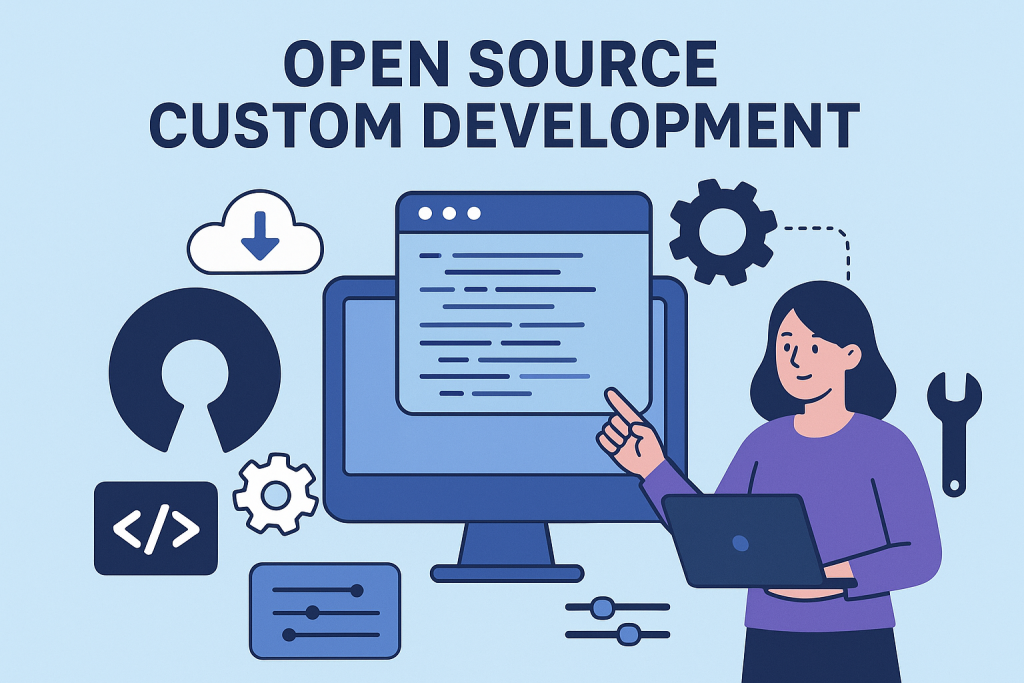In 2026, Belgium’s digital transformation is accelerating faster than ever. From small startups to enterprise-level corporations, businesses across the country are rethinking how they build, scale, and secure their digital solutions. The clear winner in this evolution? Open Source Custom Development.
Companies are now choosing open source technologies not just for cost savings but for flexibility, transparency, scalability, and innovation. As Belgium continues to strengthen its tech ecosystem, open source custom development is becoming the foundation of sustainable digital growth.

What Is Open Source Custom Development?
Open source custom development refers to building or modifying software using open-source frameworks and tools—technologies whose code is publicly available for modification and distribution.
This approach allows developers to customize solutions according to unique business needs, ensuring that the final product aligns perfectly with specific workflows, goals, and customer expectations.
Common open-source technologies used in Belgium include:
- – Laravel, Django, and Node.js for web development.
- – React and Vue.js for front-end frameworks.
- – WordPress, Drupal, and Joomla as open-source CMS platforms.
- – Odoo, ERPNext, and NocoBase for business management systems.
Why Belgian Companies Are Switching to Open Source in 2026

1. Cost Efficiency and Control
Unlike proprietary software that demands recurring licenses or vendor lock-ins, open source solutions are free to use and modify. Belgian SMEs and startups find this cost advantage critical for long-term sustainability.
Open source also provides complete control over updates, scalability, and security, which means businesses are no longer tied to external vendors or limited licensing policies.
2. Flexibility and Customization
Open source platforms empower Belgian businesses to create custom solutions tailored to their unique operations. Whether it’s integrating APIs, automating workflows, or personalizing UI/UX, the flexibility of open source ensures no compromise between creativity and functionality.
Example: A Belgian e-commerce brand can use Laravel with Vue.js to build a fully custom, multilingual storefront integrated with local payment gateways like Bancontact.
3. Community Support and Continuous Innovation
One of the strongest advantages of open source technology is its global community. Developers worldwide contribute to improving the frameworks, ensuring that the code is constantly tested, updated, and secured.
Belgian tech agencies benefit from this collaboration, gaining access to new features and innovations faster than proprietary systems typically allow.
4. Security and Transparency
Many Belgian enterprises once believed open source software was risky—but that perception has changed. Today, open source solutions are more secure because their source code is publicly audited by thousands of developers.
Organizations can identify and fix vulnerabilities quickly without waiting for vendor patches. This transparency builds confidence in sectors like finance, healthcare, and government, where data protection is paramount.
5. Government and EU Support for Open Source
Belgium’s government and the European Union both promote open source adoption as part of their digital sovereignty and sustainability goals.
Initiatives like EU Open Source Observatory (OSOR) and Digital Belgium encourage public institutions and businesses to invest in open-source-based systems. This means more grants, resources, and incentives for companies opting for open source in 2026.
6. Seamless Integration with AI and Cloud Technologies
In 2026, businesses no longer choose between innovation and affordability. Open source tools now integrate seamlessly with AI, machine learning, and cloud platforms.
Frameworks like TensorFlow, Kubernetes, and Docker—all open source—allow Belgian companies to deploy smart, scalable, and automated digital ecosystems.
7. Local Expertise and Open Source Agencies in Belgium
Belgium is home to a growing number of open source development companies offering specialized services in Laravel, WordPress, Odoo, and React.
These agencies help clients design, build, and maintain tailored solutions that align with their business vision. This rise in local expertise makes adopting open source safer and more strategic for businesses of all sizes.
Real-World Use Cases in Belgium
- – Healthcare organizations are using Odoo ERP for patient management and billing.
- – Educational institutions leverage Moodle, an open-source LMS, for e-learning.
- – Startups are deploying React + Node.js apps for SaaS solutions with minimal cost.
Municipalities adopt open source CMS platforms to maintain transparent, multilingual websites.
Future of Open Source Development in Belgium
By 2026 and beyond, open source will play a central role in Belgium’s smart city, fintech, and green tech movements. As businesses continue to adopt AI-ready, cloud-native, and API-driven architectures, open source technologies will lead the way toward innovation and efficiency.
Final Thoughts
Belgian businesses are embracing open source custom development in 2026 not just as a cost-cutting measure, but as a strategic innovation driver. The blend of flexibility, transparency, and scalability makes open source the future-ready choice for any company seeking long-term digital success.
With strong community backing, government encouragement, and advanced integration capabilities, open source CRM development is shaping Belgium’s digital future — one line of code at a time.
Frequently Asked Questions (FAQs)
1. Why are Belgian businesses adopting open source development in 2026?
Belgian companies are turning to open source development in 2026 because it offers cost efficiency, flexibility, and transparency. With open source, businesses can fully customize their software, avoid vendor lock-ins, and maintain complete control over their data and systems.
2. What are the most popular open source technologies in Belgium?
Top open source technologies used by Belgian developers include Laravel, Django, React, Node.js, WordPress, and Odoo. These frameworks power everything from websites and mobile apps to enterprise-grade ERP and CRM systems.
3. How does open source development help startups in Belgium?
For startups, open source custom development reduces initial costs and accelerates time-to-market. Belgian startups use open source to build scalable MVPs, integrate AI tools, and create secure digital ecosystems without high licensing fees.
4. Which CMS is open source?
Several open-source CMS platforms are popular in Belgium, including WordPress, Joomla, Drupal, and Ghost. These allow developers to build custom, secure, and multilingual websites without licensing costs.
5. What is the difference between OSS and SaaS?
OSS (Open Source Software) is software with publicly accessible code that users can modify and host themselves.
SaaS (Software as a Service) is a cloud-based service hosted by vendors (like Google Workspace or Salesforce) where users pay for usage without code access.
6. What does the future hold for open source development in Belgium?
Open source is set for continued growth with rising adoption of AI, cloud, and collaborative innovation, positioning Belgian companies for global competitiveness.
7. What industries in Belgium are adopting open source development?
Manufacturing, finance, healthcare, retail, and technology sectors are actively leveraging open source to innovate and optimize operations.


![Why Are People Leaving SuiteCRM? [2025 Insights & Alternatives] Why Are People Leaving SuiteCRM? [Insights & Alternatives]](https://devdiligent.com/blog/wp-content/uploads/2025/10/Untitled-design-10.png)